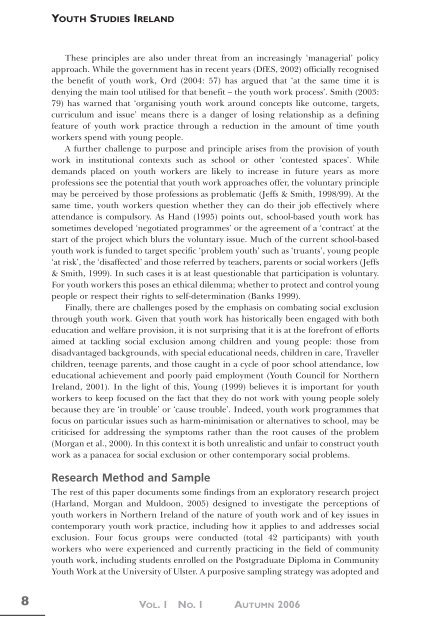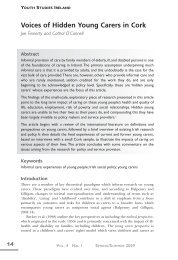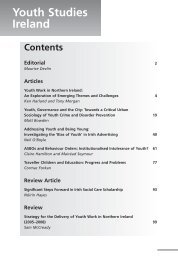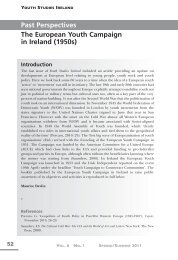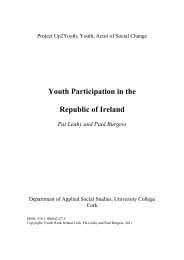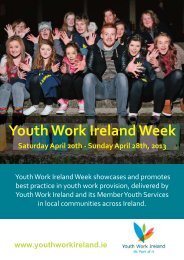Youth Work in Northern Ireland:
Youth Work in Northern Ireland:
Youth Work in Northern Ireland:
Create successful ePaper yourself
Turn your PDF publications into a flip-book with our unique Google optimized e-Paper software.
YOUTH STUDIES IRELANDThese pr<strong>in</strong>ciples are also under threat from an <strong>in</strong>creas<strong>in</strong>gly ‘managerial’ policyapproach. While the government has <strong>in</strong> recent years (DfES, 2002) officially recognisedthe benefit of youth work, Ord (2004: 57) has argued that ‘at the same time it isdeny<strong>in</strong>g the ma<strong>in</strong> tool utilised for that benefit – the youth work process’. Smith (2003:79) has warned that ‘organis<strong>in</strong>g youth work around concepts like outcome, targets,curriculum and issue’ means there is a danger of los<strong>in</strong>g relationship as a def<strong>in</strong><strong>in</strong>gfeature of youth work practice through a reduction <strong>in</strong> the amount of time youthworkers spend with young people.A further challenge to purpose and pr<strong>in</strong>ciple arises from the provision of youthwork <strong>in</strong> <strong>in</strong>stitutional contexts such as school or other ‘contested spaces’. Whiledemands placed on youth workers are likely to <strong>in</strong>crease <strong>in</strong> future years as moreprofessions see the potential that youth work approaches offer, the voluntary pr<strong>in</strong>ciplemay be perceived by those professions as problematic (Jeffs & Smith, 1998/99). At thesame time, youth workers question whether they can do their job effectively whereattendance is compulsory. As Hand (1995) po<strong>in</strong>ts out, school-based youth work hassometimes developed ‘negotiated programmes’ or the agreement of a ‘contract’ at thestart of the project which blurs the voluntary issue. Much of the current school-basedyouth work is funded to target specific ‘problem youth’ such as ‘truants’, young people‘at risk’, the ‘disaffected’ and those referred by teachers, parents or social workers (Jeffs& Smith, 1999). In such cases it is at least questionable that participation is voluntary.For youth workers this poses an ethical dilemma; whether to protect and control youngpeople or respect their rights to self-determ<strong>in</strong>ation (Banks 1999).F<strong>in</strong>ally, there are challenges posed by the emphasis on combat<strong>in</strong>g social exclusionthrough youth work. Given that youth work has historically been engaged with botheducation and welfare provision, it is not surpris<strong>in</strong>g that it is at the forefront of effortsaimed at tackl<strong>in</strong>g social exclusion among children and young people: those fromdisadvantaged backgrounds, with special educational needs, children <strong>in</strong> care, Travellerchildren, teenage parents, and those caught <strong>in</strong> a cycle of poor school attendance, loweducational achievement and poorly paid employment (<strong>Youth</strong> Council for <strong>Northern</strong><strong>Ireland</strong>, 2001). In the light of this, Young (1999) believes it is important for youthworkers to keep focused on the fact that they do not work with young people solelybecause they are ‘<strong>in</strong> trouble’ or ‘cause trouble’. Indeed, youth work programmes thatfocus on particular issues such as harm-m<strong>in</strong>imisation or alternatives to school, may becriticised for address<strong>in</strong>g the symptoms rather than the root causes of the problem(Morgan et al., 2000). In this context it is both unrealistic and unfair to construct youthwork as a panacea for social exclusion or other contemporary social problems.Research Method and SampleThe rest of this paper documents some f<strong>in</strong>d<strong>in</strong>gs from an exploratory research project(Harland, Morgan and Muldoon, 2005) designed to <strong>in</strong>vestigate the perceptions ofyouth workers <strong>in</strong> <strong>Northern</strong> <strong>Ireland</strong> of the nature of youth work and of key issues <strong>in</strong>contemporary youth work practice, <strong>in</strong>clud<strong>in</strong>g how it applies to and addresses socialexclusion. Four focus groups were conducted (total 42 participants) with youthworkers who were experienced and currently practic<strong>in</strong>g <strong>in</strong> the field of communityyouth work, <strong>in</strong>clud<strong>in</strong>g students enrolled on the Postgraduate Diploma <strong>in</strong> Community<strong>Youth</strong> <strong>Work</strong> at the University of Ulster. A purposive sampl<strong>in</strong>g strategy was adopted and8 VOL. 1 NO. 1 AUTUMN 2006


